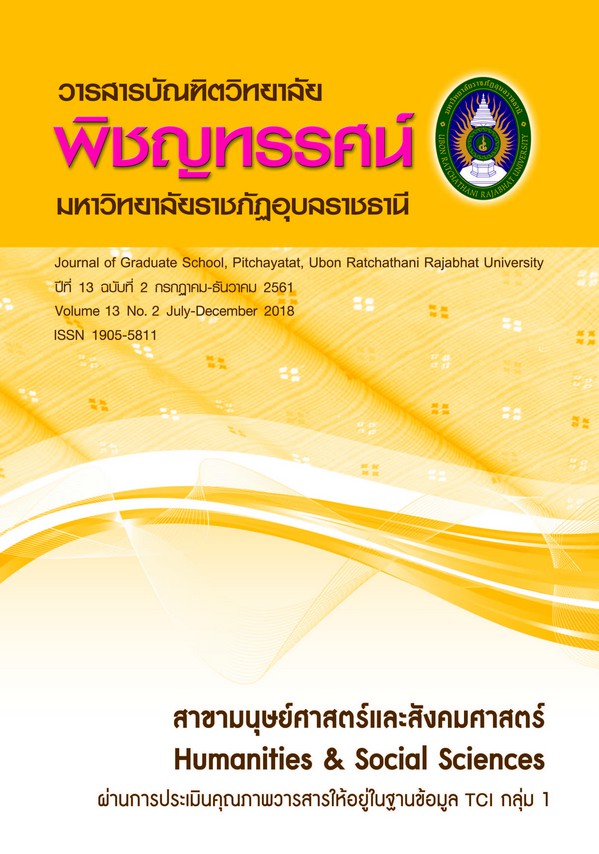การพัฒนาผลสัมฤทธิ์ทางการเรียน เรื่องเศษส่วนของพหุนาม ตามรูปแบบการจัดการเรียนรู้ โดยใช้ปัญหาเป็นฐานของนักเรียนชั้นมัธยมศึกษาปีที่ 3
คำสำคัญ:
การพัฒนาผลสัมฤทธิ์, เศษส่วนของพหุนาม, การจัดการเรียนรู้โดยใช้ปัญหาเป็นฐานบทคัดย่อ
การวิจัยครั้งนี้มีวัตถุประสงค์เพื่อเปรียบเทียบผลสัมฤทธิ์ทางการเรียนก่อนเรียนและหลังเรียน กลุ่มสาระการเรียนรู้คณิตศาสตร์ด้วยการจัดการเรียนรู้โดยใช้ปัญหาเป็นฐาน เรื่อง เศษส่วนของพหุนามเปรียบเทียบความก้าวหน้าในการเรียนรู้ของผู้เรียน กลุ่มเก่ง กลุ่มปานกลาง และกลุ่มอ่อน ก่อนและหลังได้รับการเรียนรู้โดยใช้ปัญหาเป็นฐาน และศึกษาความคงทนในการเรียนรู้ของนักเรียน ตัวอย่างที่ใช้ คือ นักเรียนชั้นมัธยมศึกษาปีที่ 3/2 โรงเรียนมหาชนะชัยวิทยาคม อำเภอมหาชนะชัย จังหวัดยโสธร จำนวน 27 คน เครื่องมือที่ใช้ในการวิจัย ได้แก่ แผนการจัดการเรียนรู้โดยใช้ปัญหาเป็นฐาน แบบทดสอบวัดผลสัมฤทธิ์ทางการเรียน และแบบทดสอบวัดความคงทนในการเรียนรู้ สถิติที่ใช้ในการวิจัย คือ ร้อยละ ค่าเฉลี่ย ส่วนเบี่ยงเบนมาตรฐาน และทดสอบสมมุติฐานโดยใช้การทดสอบค่าทีแบบกลุ่มสัมพันธ์ ผลการวิจัยพบว่า 1. นักเรียนที่ได้รับการเรียนรู้เรื่อง เศษส่วนของพหุนาม ตามรูปแบบการจัดการเรียนรู้โดยใช้ปัญหาเป็นฐาน ที่ผู้วิจัยสร้างขึ้น มีผลสัมฤทธิ์ทางการเรียนหลังเรียนสูงกว่าก่อนเรียน ที่ระดับนัยสำคัญ .05 2. นักเรียนที่ได้รับการเรียนรู้เรื่อง เศษส่วนของพหุนาม ตามรูปแบบการจัดการเรียนรู้โดยใช้ปัญหาเป็นฐาน มีความก้าวหน้าในการเรียนรู้ ซึ่งนักเรียนกลุ่มเก่งมีความก้าวหน้าในการเรียนรู้มากที่สุด 3. นักเรียนที่ได้รับการเรียนรู้ เรื่อง เศษส่วนของพหุนาม ตามรูปแบบการจัดการเรียนรู้โดยใช้ปัญหาเป็นฐาน มีผลสัมฤทธิ์ทางการเรียนหลังเรียนกับหลังเรียนไปแล้ว 14 วัน ไม่แตกต่างกัน ที่ระดับนัยสำคัญ .05
เอกสารอ้างอิง
ดวงหทัย กาศวิบูลย์. การเรียนรู้โดยใช้ปัญหาเป็นฐาน (PBL) ในงานวิจัยทางการศึกษา การวิจัยทางการศึกษา. 6, 1 (มกราคม 2550): 14-22.
นิวัฒน์ สารขันธ์. กิจกรรมเสริมความคิดเรียนคณิตให้สนุก. วารสารวิชาการ. 5, 9 (กันยายน 2545): 58-56.
พวงรัตน์ บุญญานุรักษ์ และ Majumdar Basanti. การเรียนรู้โดยใช้ปัญหา. กรุงเทพฯ, 2544.
มัณฑรา ธรรมบุศย์. การพัฒนาคุณภาพการเรียนรู้โดยใช้ PBL(Problem-Based Learning) วารสารวิชาการ 5, 2 (กุมภาพันธ์ 2545): 11-17.
ยุรวัฒน์ คล้ายมงคล. การพัฒนากระบวนการเรียนการสอนโดยการประยุกต์แนวคิดการใช้ปัญหาเป็นหลักในการเรียนรู้เพื่อสร้างเสริมสมรรถภาพทางคณิตศาสตร์ของนักเรียนชั้นประถมศึกษาปีที่ 5 ที่มีความสามารถพิเศษทางคณิตศาสตร์. วิทยานิพนธ์ครุศาสตรดุษฎีบัณฑิต จุฬาลงกรณ์มหาวิทยาลัย, 2545.
รังสรรค์ ทองสุขนอก. ชุดการเรียนการสอนที่ใช้ปัญหาเป็นฐานในการเรียนรู้ (Problem- Based Learning) เรื่องทฤษฎีจานวนเบื้องต้น ระดับชั้นมัธยมศึกษาปีที่ 4. ปริญญานิพนธ์การศึกษามหาบัณฑิต มหาวิทยาลัยศรีนครินทรวิโรฒ, 2547.
ราตรี เกตบุตตา. ผลของการเรียนแบบใช้ปัญหาเป็นหลักต่อความสามารถในการแก้ปัญหาและความคิดสร้างสรรค์ทางคณิตศาสตร์ของนักเรียนชั้นมัธยมศึกษา. วิทยานิพนธ์ครุศาสตร์มหาบัณฑิต จุฑาลงกรณ์มหาวิทยาลัย, 2546.
เลขาธิการสภาการศึกษา, สานักงาน. กรอบทิศทางการพัฒนาการศึกษาในช่วงแผนพัฒนาเศรษฐกิจและสังคมแห่งชาติ ฉบับที่ 10 (พ.ศ. 2550-2554) ที่สอดคล้องกับแผนการศึกษาแห่งชาติ(พ.ศ. 2545-2549). กรุงเทพฯ: โรงพิมพ์แห่งจุฬาลงกรณ์มหาวิยาลัย, 2551.
วิชาการและมาตรฐานการศึกษา, สานักงาน. รายการสังเคราะห์การใช้หลักสูตรแกนกลางการศึกษาขั้นพื้นฐาน พุทธศักราช 2551. กรุงเทพฯ: กลุ่มวิจัยและพัฒนาคุณภาพ การเรียนรู้ สานัก วิชาการและมาตรฐานการศึกษา สานักงานและคณะกรรมการการศึกษาขั้นพื้นฐานกระทรวงศึกษาธิการ, 2551
ศิริพร ทิพย์คง. การสอนที่ใช้ปัญญาเป็นฐาน วารสารคณิตศาสตร์. 48, 551 (สิงหาคม-ตุลาคม 2547): 64.
Delisie, Robert. How to use Problem-Based Learning in the Classroom. Alexandria, Virginia: Association for Supervision and Curriculum Development, 1997.
ดาวน์โหลด
เผยแพร่แล้ว
รูปแบบการอ้างอิง
ฉบับ
ประเภทบทความ
สัญญาอนุญาต
บทความทุกเรื่องได้รับการตรวจความถูกต้องทางวิชาการโดยผู้ทรงคุณวุฒิภายนอกอย่างน้อย 3 คน ความคิดเห็นในวารสารพิชญทรรศน์เป็นความคิดเห็นของผู้นิพนธ์มิใช่ความคิดเห็นของผู้จัดทำ จึงมิใช่ความรับผิดชอบของวารสารพิชญทรรศน์ และบทความในวารสารพิชญทรรศน์สงวนสิทธิ์ตามกฎหมายไทย การจะนำไปเผยแพร่ต้องได้รับอนุญาตเป็นลายลักษณ์อักษรจากกองบรรณาธิการ





